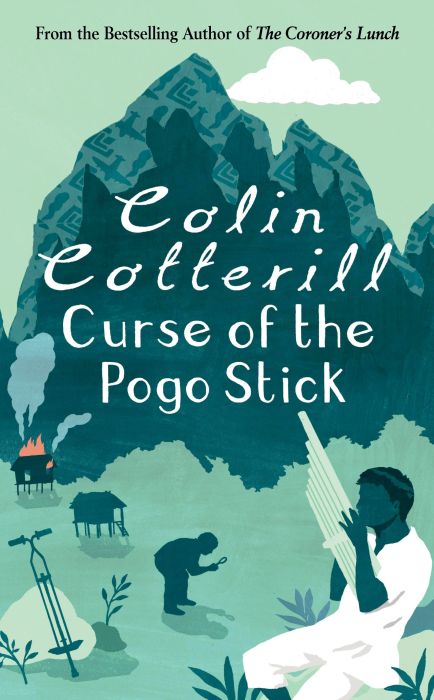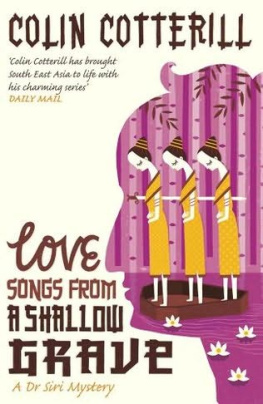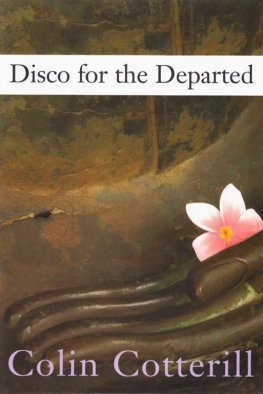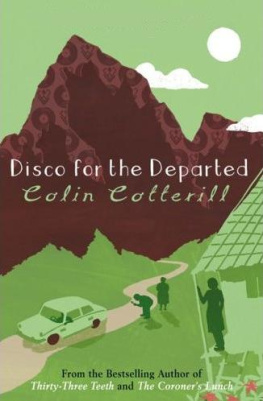Colin Cotterill - Curse of the Pogo Stick
Here you can read online Colin Cotterill - Curse of the Pogo Stick full text of the book (entire story) in english for free. Download pdf and epub, get meaning, cover and reviews about this ebook. year: 2009, publisher: Quercus, genre: Detective and thriller. Description of the work, (preface) as well as reviews are available. Best literature library LitArk.com created for fans of good reading and offers a wide selection of genres:
Romance novel
Science fiction
Adventure
Detective
Science
History
Home and family
Prose
Art
Politics
Computer
Non-fiction
Religion
Business
Children
Humor
Choose a favorite category and find really read worthwhile books. Enjoy immersion in the world of imagination, feel the emotions of the characters or learn something new for yourself, make an fascinating discovery.

- Book:Curse of the Pogo Stick
- Author:
- Publisher:Quercus
- Genre:
- Year:2009
- Rating:5 / 5
- Favourites:Add to favourites
- Your mark:
- 100
- 1
- 2
- 3
- 4
- 5
Curse of the Pogo Stick: summary, description and annotation
We offer to read an annotation, description, summary or preface (depends on what the author of the book "Curse of the Pogo Stick" wrote himself). If you haven't found the necessary information about the book — write in the comments, we will try to find it.
Curse of the Pogo Stick — read online for free the complete book (whole text) full work
Below is the text of the book, divided by pages. System saving the place of the last page read, allows you to conveniently read the book "Curse of the Pogo Stick" online for free, without having to search again every time where you left off. Put a bookmark, and you can go to the page where you finished reading at any time.
Font size:
Interval:
Bookmark:
 |
Colin Cotterill
The Curse of the Pogo Stick
The fifth book in the Dr Siri Paiboun series
2008
In Vientiane, a booby-trapped corpse, intended for Dr. Siri, the national coroner of Laos, has been delivered to the morgue. In his absence, only Nurse Dtuis intervention saves the lives of the morgue attendants, visiting doctors, and Madame Daeng, Dr. Siris fianc.
On his way back from a communist party meeting in the north, Dr. Siri is kidnapped by seven female Hmong villagers under the direction of the village elder so that he will-in the guise of Yeh Ming, the thousand-year-old shaman with whom he shares his body-exorcise the headmans daughter whose soul is possessed by a demon, and lift the curse of the pogo stick.
A s there were no longer any records, the Hmong could not even tell when they actually misplaced their history. The event had deleted itself. But the oral legend that was passed on unreliably like a whisper from China would have them believe the following:
The elders of the Hmong tribes had gathered to lead the great exodus. For countless centuries, their people had been victimized by the mandarins. With no more will to fight, the time had come to flee. Traditional nomads, the Hmong had few valuable possessions to carry. They would lead their animals and build new homes when they reached the promised lands to the south. But there was one artefact that belonged to all the Hmong. It was the sacred scroll that contained their written language, legends, and myths of ancestors in a sunless, ice-covered land, and, most importantly, the map of how to reach their nirvana: the Land of the Dead in the Otherworld.
With great ceremony, the scroll was removed from its hiding place, wrapped in goat hide, and given the position of honour at the head of the caravan. The Hmong walked for a hundred days and a hundred nights and on the hundred and first night they were lashed by a monsoon that drenched them all before they could find shelter. Cold and wet, they sat shivering in a cave until the sun rose. The keeper of the scroll was distraught to discover that the rain had soaked through the goat hide and dampened the sacred document. Chanting the appropriate mantras, they unrolled the text and laid it on the grass to dry beneath the hot morning sun. And the followers, exhausted from their sleepless night, found shade under the trees and fell into a deep sleep.
While they slumbered, a herd of cattle found its way up to the mountain pass and discovered both the sleeping Hmong and the hemp scroll inscribed with vegetable dyes. And, starved of new culinary experiences, they set about eating this delicious breakfast with vigour. The Hmong awoke to find their sacred scroll chewed to pieces. They chased off the cattle and collected the surviving segments. These they entrusted to a shaman who stayed awake with them and kept them safe and dry for the next hundred days and hundred nights. But on the hundred and first day, the clouds finally parted and the sun shone and the Hmong found themselves in a deserted village. Not one to ignore the lessons of experience, the shaman laid out the segments in the loft of the longhouse. Certain the remnants of the scroll wouldnt be attacked by cattle or goats or birds there, he finally joined his brothers and sisters in a well-earned sleep. But he hadnt taken the rats into account. Half-starved and desperate, the rats set about the hemp and devoured it in a frenzy. Unsated, but with the memory of food now implanted in their minds, they then turned upon one another. When the Hmong finally climbed into the loft, all they found were several ratty corpses and a few unreadable shreds of their culture. This, according to the legend, was how the Hmong lost their history and their written language.
The spirit of the first-ever Hmong shaman, See Yee, looked up from the Otherworld and was mightily pissed that his people could be so careless. He stewed over this for a lifetime or two before he could find it in his heart to forgive them. But he didnt send them a new scroll or a new script, for that really would have been tempting fate. Instead, he taught six earthly brothers how to play six music pipes of different lengths. By playing together, this sextet found they were able to guide the dead to the Otherworld without the map. But, as they got older and found themselves with more personal commitments, it wasnt always easy to get them together to perform. So See Yee taught mankind how to put the six pipes together and play them with six fingers as one instrument. Thus, the geng was born.
When the geng was played, people swore they could hear the voices of the ancestors. It was as if their spirits were retelling the history and describing the path to the afterlife through the sounds of the instrument. Music became the medium through which the Hmong recorded their legends. The notes had replaced the written text. The music of the geng could be used to teach new generations about their past and their future lives. They had no need for books.
The Western missionaries, of course, had no ear for such foolishness. They considered a race without a written text to be barbaric and ignorant. So, they created a roman phonetic system as the basis for a script for the Hmong that was impossible to read without learning a lot of complicated rules. The clever churchmen believed they had bonded together the diffuse Hmong tribes through this linguistic subjugation, but the Hmong knew better. They learned the text to keep the missionaries in their place, but they had a system that was far more advanced than anything devised in the West. They had a musical language that communicated directly from one soul to another.
THE STIFF
W hat is that god-awful row?
One of those Hmong beggars playing his flute by the sounds of it.
Well, its annoying. Doesnt he know this is a hospital? Cant you go tell him to shut up?
Youve got legs. You tell him.
Im in the middle of something.
And Im not?
The morgue was made of concrete, and secrets had no cracks to hide in. From their corpse-side seats, Nurse Dtui and Madame Daeng could hear every disparaging word the two clerks spoke. The auditors were like an unhappily married couple. The pale-faced men in their frayed white shirts and polyester slacks had ghosted in the previous morning. Theyd handed Dtui their official placement papers from the Justice Department and commandeered the office. Theyd taken advantage of the coroners absence and chosen this week to go through his books for the 1977 audit. It appeared theyd been instructed to find errors in the records. Dtui had known straight away that that task was virtually impossible, given that her boss had handwriting so horrible he could hardly read it himself. Dipping a cockroach in ink and having it scamper around the page would have left more legible traces to the average reader.
But Nurse Dtui had to admire the auditors determination. They had every flat surface in the office covered in a layer of grey papers and were tiptoeing barefoot between them. Theyd been through the entire first drawer of the filing cabinet and were making copious notes in their ledgers. Theyd been instructed not to discuss their mission with menial staff so Dtui had no way of helping them find whatever it was they were searching for.
Lets go and get lunch, one of them said.
Hm.
It was the first thing theyd agreed on since their arrival. Dtui and Daeng heard one or two paper rustles, the closing and locking of a door that hadnt been squeezed into its misshapen frame for many years, and a cough from just outside the room where the two ladies sat.
Font size:
Interval:
Bookmark:
Similar books «Curse of the Pogo Stick»
Look at similar books to Curse of the Pogo Stick. We have selected literature similar in name and meaning in the hope of providing readers with more options to find new, interesting, not yet read works.
Discussion, reviews of the book Curse of the Pogo Stick and just readers' own opinions. Leave your comments, write what you think about the work, its meaning or the main characters. Specify what exactly you liked and what you didn't like, and why you think so.





